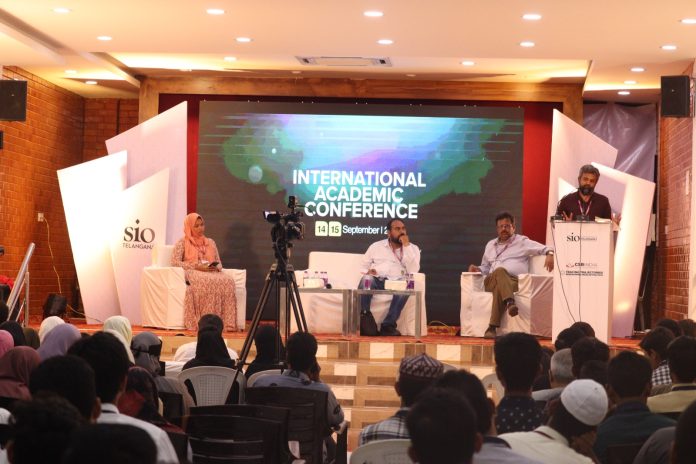Hyderabad: SIO Telangana held an International Academic conference titled “Reimagining Muslim Politics” here on Saturday and Sunday. This landmark event aimed to foster a new era of critical thinking and intellectual exchange among scholars, activists, and policymakers from around the globe.
The conference delved into the complex and multifaceted issues surrounding Muslim political identity, representation, and agency in the contemporary world. Through a series of thought-provoking sessions, participants explored the challenges and opportunities facing Muslim communities and examined potential pathways for a more just, inclusive, and equitable future.
Addressing the Plenary Session titled Reimagining the Political Future of Muslims in India, Ameer-e-Jamaat, Syed Sadatullah Husaini delved into the historical and contemporary contexts of Muslim politics in India, examining the evolving dynamics of identity, representation, and participation. He stated, “Islam provides the foundation of Justice as the political premise. The absentia of the three components sums up the political weakness of Muslim community in India: Clarity about Identity and Position, Clear Political Vision, and Pragmatic Political Programme.”
On Telangana Muslim: Between Minority and Marginalisation, Prof. Amirullah Khan (Development economist, Professor, TSPSC Board member) focused on the critical role of Muslims in shaping political discourse and public perceptions. Participants analysed the use of role and rhetoric of Muslim politics.
Dr Irfan Ahmed, Professor from Ibn Haldun University, Turkey addressed on Decolonizing Democracy: Towards A Fair Indian Model Based on Share & Care.
Abdul Hafeez, SIO Telangana President, stated, “This International Academic conference provided the platform to bright minds across various eminent central universities as well as students of diverse academic riggers. It engages topics like Muslim political imagination in India, Muslim engagement with state, Participatory Democracy, surveillance of state, etc. By this exercise, we want to create an academic activism among community and create a narrative which can guide the collective struggle.”
The conference featured a diverse range of speakers, including renowned International scholars, activists, and policymakers from around the world. Through engaging presentations, panel discussions, participants had the opportunity to share their insights, engage in critical dialogue, and contribute to a collective understanding of the complex issues at stake.




